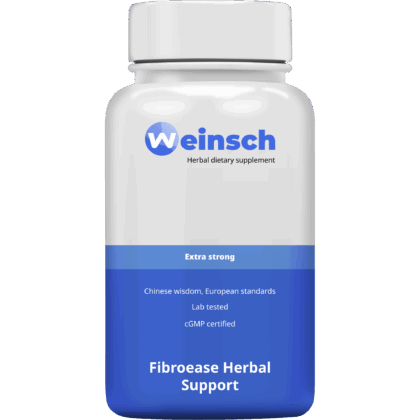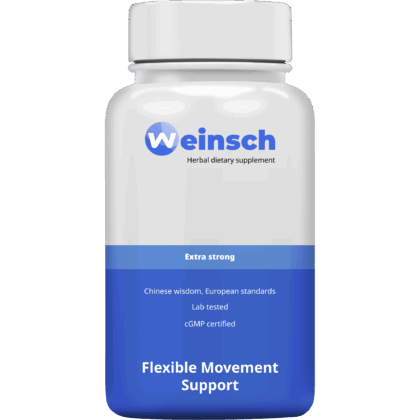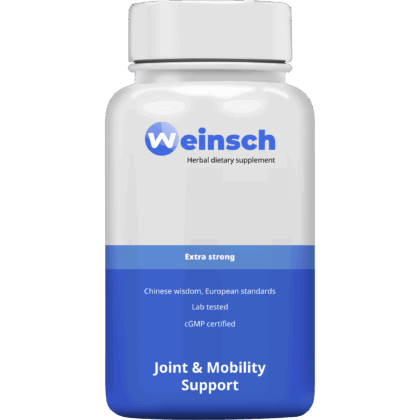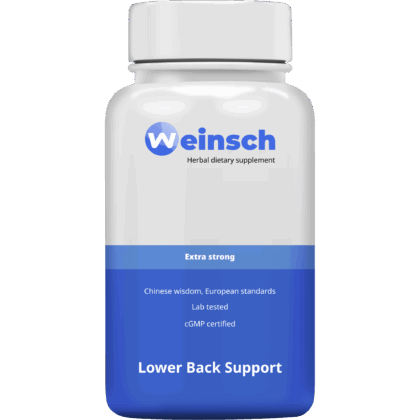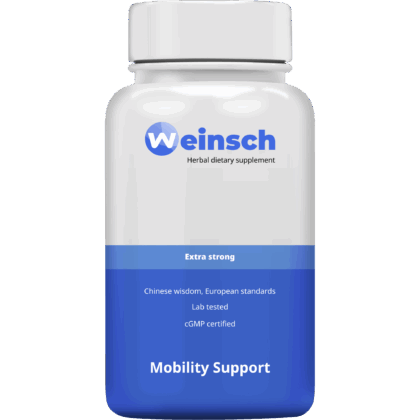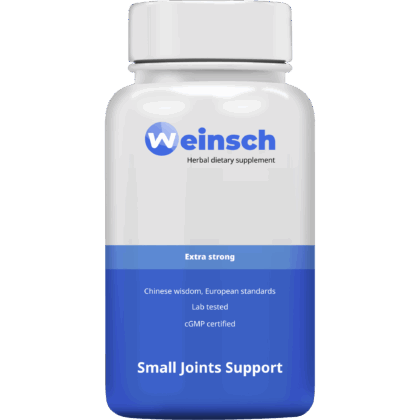Weinsch Joint Vitality in the context of Traditional Chinese Medicine (TCM) focuses on promoting joint health, reducing pain, and ensuring the smooth movement of Qi and blood through the joints. TCM views joint health as interconnected with the Liver, Kidneys, and Spleen, as well as the flow of Qi, Blood, and Yin throughout the body. Joint vitality is not just about reducing inflammation or pain but ensuring that the body’s internal energies are balanced and that nutrients are being efficiently delivered to the joints.
Joint Vitality in TCM
In TCM, the health of the joints is heavily influenced by the following:
- Qi and Blood Flow: The proper circulation of Qi and Blood is crucial for joint health. Blockages or stagnation in the flow of Qi and blood can lead to pain, stiffness, and reduced mobility.
- Kidney Essence (Jing): The Kidneys are believed to play a central role in the health of the bones and joints. Deficiency in Kidney Jing can result in joint weakness, pain, and other musculoskeletal issues.
- Liver Qi: The Liver is responsible for the smooth flow of Qi throughout the body, including the tendons and joints. When Liver Qi is stagnated, it can cause stiffness, pain, and discomfort in the joints.
- Dampness and Wind: In TCM, external pathogens like Wind, Cold, and Dampness can invade the joints, leading to conditions like arthritis, rheumatism, or general joint pain.
Chinese Herbs for Joint Vitality
Several herbs in TCM are used to nourish the kidneys, promote blood circulation, and alleviate pain or stiffness in the joints. These herbs work together to support the body’s ability to heal and maintain strong, flexible joints.
- Du Zhong (Eucommia Bark): A powerful herb for joint health, Du Zhong is used to strengthen the lower back, knees, and joints. It is commonly used for conditions like osteoarthritis and back pain due to Kidney deficiency.
- Gou Ji (Cibotium): Gou Ji is used for its ability to tonify the Liver and Kidneys, strengthen the bones and joints, and alleviate pain from joint weakness or injury.
- Xu Duan (Dipsacus): Known for its ability to strengthen the bones, tendons, and joints, Xu Duan is used in TCM to treat pain and stiffness in the joints, especially when it’s caused by kidney deficiency or trauma.
- Cang Zhu (Atractylodes): Cang Zhu is used to resolve dampness, which can lead to joint pain and swelling. It is often used in formulas for conditions like rheumatoid arthritis, where dampness accumulates in the joints.
- Wu Jia Pi (Acanthopanax): Wu Jia Pi is used to invigorate blood circulation and improve joint flexibility. It helps reduce joint stiffness and is particularly beneficial for pain related to wind-damp conditions.
- Yi Yi Ren (Coix Seed): Known for its ability to clear dampness, Yi Yi Ren is often used in TCM for joint pain caused by dampness or fluid retention in the joints.
- Ji Xue Teng (Spatholobus): Ji Xue Teng is used to promote blood circulation and invigorate the flow of Qi in the body. It helps relieve pain and stiffness in the joints by improving the delivery of nutrients and energy.
- Hong Hua (Safflower): Hong Hua is used to invigorate the blood, relieve pain, and promote circulation. It is commonly used in formulas for joint pain, particularly when there is blood stagnation or poor circulation.
- Dang Gui (Angelica Sinensis): Dang Gui is a powerful blood tonic that nourishes the blood and promotes circulation. It is used in TCM for joint pain related to blood deficiency or stagnation.
Functions & Indications
- Tonifies the Kidneys: The Kidneys are considered the root of bone and joint health in TCM. Herbs like Du Zhong and Gou Ji strengthen the Kidneys and support the bones and joints.
- Promotes Blood Circulation: Herbs like Hong Hua, Ji Xue Teng, and Wu Jia Pi are used to invigorate blood flow and alleviate pain due to stagnation or poor circulation.
- Clears Dampness: Dampness can accumulate in the joints, leading to swelling and pain. Herbs like Cang Zhu and Yi Yi Ren help clear dampness and improve joint flexibility.
- Nourishes Blood and Qi: Herbs like Dang Gui and Xu Duan help nourish blood and Qi, which are essential for the health of the joints and tendons.
- Relieves Pain and Inflammation: Du Zhong, Gou Ji, and Cang Zhu are used to relieve pain and inflammation in the joints, particularly in conditions like arthritis.
Tongue & Pulse
- Tongue: A tongue that appears swollen or has a thick, greasy coating may indicate dampness or fluid retention in the joints. A pale tongue suggests blood deficiency, while a red tongue indicates heat, which could be causing inflammation.
- Pulse: A slippery pulse can indicate dampness or phlegm accumulation, while a weak, thin pulse may indicate Qi or blood deficiency in the joints. A wiry pulse may suggest Liver Qi stagnation, which can contribute to joint pain.
Related Concerns
- Kidney Deficiency: Joint pain, especially in the lower back and knees, is often associated with Kidney deficiency in TCM. Du Zhong, Xu Duan, and Gou Ji are commonly used to strengthen the Kidneys and support joint health.
- Dampness and Wind: External pathogens like dampness and wind can cause pain, swelling, and stiffness in the joints. Cang Zhu and Yi Yi Ren are used to clear these pathogens and alleviate symptoms.
- Blood Stagnation: Blood stagnation can lead to pain and stiffness in the joints. Herbs like Hong Hua and Ji Xue Teng are used to invigorate the blood and promote circulation to the joints.
Clinical Applications
- Arthritis and Rheumatism: TCM herbs like Du Zhong, Gou Ji, and Cang Zhu are commonly used to treat arthritis, rheumatism, and other joint conditions, particularly when dampness or blood stagnation is involved.
- Joint Pain and Stiffness: For joint pain caused by poor circulation, Hong Hua, Ji Xue Teng, and Wu Jia Pi help to invigorate blood and Qi, reducing pain and stiffness.
- Back Pain and Lower Back Issues: Herbs like Du Zhong and Xu Duan are used to treat lower back pain and stiffness, especially when caused by Kidney deficiency.
- Musculoskeletal Injury: For joint pain related to trauma or injury, Xu Duan and Du Zhong help strengthen the tendons, bones, and joints, aiding in recovery and relieving pain.
Lifestyle Recommendations for Joint Vitality
- Diet: A diet that nourishes the kidneys, strengthens the bones, and improves circulation is key for joint vitality. Foods like bone broth, black sesame seeds, walnuts, and root vegetables are beneficial for joint health.
- Exercise: Regular exercise, particularly low-impact activities like swimming, walking, or Tai Chi, helps improve joint flexibility and strength.
- Avoid Dampness: In TCM, excessive dampness can contribute to joint pain and stiffness. Avoiding excessive cold, damp, or greasy foods is important to prevent these issues.
-
FibroEase Herbal Support Extra Strong 120 tablets 10:1 500 mg
€ 19,95 -
Flexible Movement Support Extra Strong 120 tablets 10:1 500 mg
€ 19,95 -
Joint & Mobility Support Extra Strong 120 tablets 10:1 500 mg
€ 21,95 -
Lower Back Support Extra Strong 120 tablets 10:1 500 mg
€ 19,95 -
Mobility Support Extra Strong 120 tablets 10:1 500 mg
€ 19,95 -
Small Joints Support Extra Strong 120 tablets 10:1 500mg
€ 19,95

